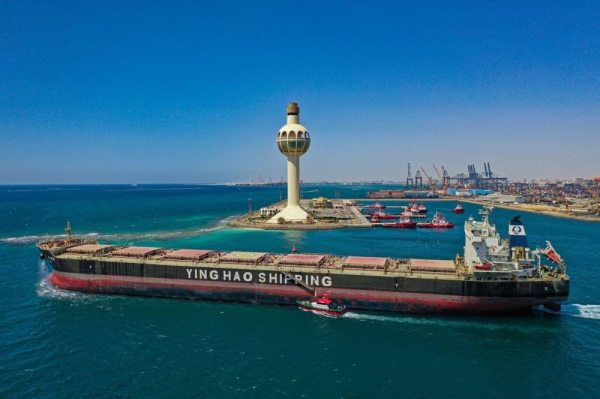Saudi Arabia’s seaports have seen a significant increase in their international ranking in container handling, moving from 16th to 15th place globally. This improvement is outlined in the 2024 edition of the ‘Lloyd’s List One Hundred Ports’ report. Jeddah Islamic Port experienced a substantial jump from 41st to 32nd place globally, handling around 5.6 million standard containers last year, a 12.6% increase from the previous year. King Abdullah Port also advanced from 71st to 70th place, recording 2.93 million standard containers. King Abdulaziz Port in Dammam saw growth as well, moving from 90th to 82nd place with 2.305 million standard containers handled.
Chairman of the Saudi Ports Authority (MAWANI), Omar Al-Hariri, emphasized that the growth rates and increased number of containers being handled in Saudi Arabia’s ports demonstrate the Kingdom’s status as a global logistics powerhouse. The ports sector plays a crucial role in supporting the national economy, enhancing export and trade activities, and facilitating supply chain movements. To further enhance operational efficiency, MAWANI has signed development and commercial support contracts aimed at increasing the capacity of container terminals at Jeddah Islamic Port by over 70% and King Abdulaziz Port in Dammam by more than 120%.
With the continuous growth and development of Saudi Arabia’s ports, the country’s overall standing in the global logistics industry is expected to strengthen even further. The significant improvements in container handling capacity and efficiency will not only bolster the Kingdom’s economy but also attract more international trade and investment opportunities. Saudi Arabia’s strategic location at the crossroads of key global trade routes positions its ports as vital hubs for maritime shipping and logistics activities in the region.
The increase in container handling numbers at Saudi seaports reflects the ongoing efforts and investments made in the country’s logistics infrastructure. The development of container terminals and the implementation of advanced technologies have played a crucial role in enhancing operational efficiency and meeting the growing demands of global trade. By continuously upgrading and expanding its port facilities, Saudi Arabia aims to solidify its position as a leading player in the global maritime industry and attract more shipping lines and logistics companies to its ports.
As Saudi Arabia’s ports continue to climb the global rankings, the country’s maritime sector is set to play an increasingly important role in supporting various industries and driving economic growth. The proactive approach taken by MAWANI in signing development contracts and enhancing terminal capacities underscores the government’s commitment to maintaining a world-class port infrastructure that meets the highest international standards. By focusing on innovation, sustainability, and efficiency, Saudi Arabia is positioning itself as a key player in the global supply chain network and a preferred destination for maritime trade activities.
In conclusion, Saudi Arabia’s rising international ranking in container handling is a testament to the country’s commitment to enhancing its ports’ efficiency and capacity. The continuous investments in infrastructure and technology, coupled with strategic partnerships and development contracts, are key drivers behind the growth of Saudi Arabia’s maritime sector. As the Kingdom strengthens its position in the global logistics industry, opportunities for trade, investment, and economic development are expected to expand, further solidifying Saudi Arabia’s status as a key player in the international maritime trade network.











